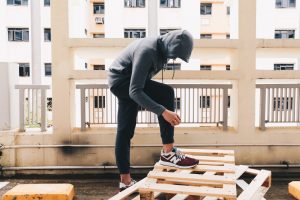I’m not built like your typical Singaporean guy. I’m ridiculously tall for an Asian – at 1.84m I’m in the 96th percentile of Singaporean males. My shoulders are curiously broad, partly due to genetics, as well as a lot of swimming in my younger years. I have a wide chest, probably due to my gymming days in early JC. My legs are long and powerful too – at least I think they’d be powerful if I trained them.
The truth is, I’m a slob when it comes to exercise. I run twice a month – or maybe twice a year? – and I’ve never been in a sports CCA before, save for a short stint in softball in lower secondary school. So it gets a little awkward when people ask what I do in my spare time.
Those conversations usually go like this:
“Wow from ACS(I), you must be a rugger!”
“No actually, I don’t play rugby.”
“Oh okay, swimming then!”
“No, not really.”
“Oh wow, errr, basketball? You’re really tall!”
“No, not that either.”
“Oh what CCA are you in then?”
“Guitar orchestra.”
“Oh. That’s interesting.”
I hated Chinese New Year for that reason. How do you explain to inquisitive relatives that you’d rather use your bulky, hefty, 1.84m tall body to play guitar, write poetry and take photographs, instead of playing sports? Or getting fit? Or building muscle?

For the longest time, I felt like I had wasted my body. I had a decent natural build, but did nothing to train it up. From a distance, I appeared well-built and “buff”, as they call it, but up close, everything was laid bare. Every sliver of fat, every inch of soft tissue – all a waste of a good body.
“Bro, I’d kill to have your build.”
“Seriously, why don’t you train it? You know how lucky you are to have that build?”
“Wah, you so slack also can look like that. Seriously wasted on you sia.”
I began to loathe my very skin. It placed upon me expectations I had never asked for. So I covered it all up as best I could, throwing on jackets to make sure as little cloth clung to my skin as possible. I wanted to hide my shape, hide my physique – hide my height even, as if that were possible.
I began to loathe my very skin. It placed upon me expectations I had never asked for.
Which meant that I kept having to deflect questions about my attire, especially in hot weather. But I preferred the uncomfortable feeling of sweaty clothes over the feeling that people could tell what it looked like underneath.
The end to all this madness began when I heard the bit in Psalms 139:14 which says, “I praise you, for I am fearfully and wonderfully made” – through a Hillsong Women’s Conference trailer, of all things.
At that point, to be honest, that verse didn’t help much. What did it mean to be fearfully and wonderfully made? What does that look like? What does that mean for me now?
I think the issue with throwing that verse around so loosely can already be found in the way we quote it, Psalms 139:14. Psalms 139 is 24 verses long, and quite frankly, little of it is about us, much less our bodies. Just looking at the first 6 verses: David mentions nothing about his physical body.
Instead, he cries out in adoration about how God has “searched” and “known” him, how He has “discerned (his) thoughts from afar”. Later he cries out in hopeful helplessness, “Where shall I go from your Spirit? Or where shall I flee from your presence?”
It’s only in verses 13 to 16 that he mentions anything remotely referring to his physical body; even then, given the context of the verse, it wouldn’t be far off to presume that David wasn’t just referring to his physical body, but his entire being – soul, spirit and body.
For you formed my inward parts;
You knitted me together in my mother’s womb.
I praise you, for I am fearfully and wonderfully made.
Wonderful are your works;
My soul knows it very well.
My frame was not hidden from you,
When I was being made in secret,
Intricately woven in the depths of the earth.
Your eyes saw my unformed substance;
in your book were written, every one of them,
the days that were formed for me,
when as yet there was none of them.
The revelation God gave to me here wasn’t what I was looking for; He didn’t tell me that I was physically incredibly attractive, and that the rest of the world was just blind to it, nor did He tell me to ignore the advice friends had given regarding my physical fitness.
The revelation I received was less about me, and more about God. How well we see ourselves has everything to do with how well we see who God is. “I praise you, for I am fearfully and wonderfully made” – note here that throughout the psalm, David mentions nothing about how he looks, or about how others look at or perceive him. Instead, what he declares is how God has made him, fearfully and wonderfully.
David’s self-worth has nothing to do with himself, and everything to do with God’s character.
God knows us and sees us before we are formed, and it is with great care and beauty that He forms us. Indeed, David declares in the subsequent verse, “Wonderful are Your works”. Not so much that I am wonderful, or that I look wonderful, but that His works are wonderful, and I am His working.
David’s self-worth has nothing to do with himself, and everything to do with God’s character.
How God sees us is how we should and must see ourselves.
There’s nothing wrong with training and keeping fit, yet our eyes must always be fixed on the one who created us: His character and working defines His creation.
These days, I don’t wear jackets as often. My Father sees and knows me the same: Fearfully and wonderfully made, no matter what clothes I try to hide it all under.









